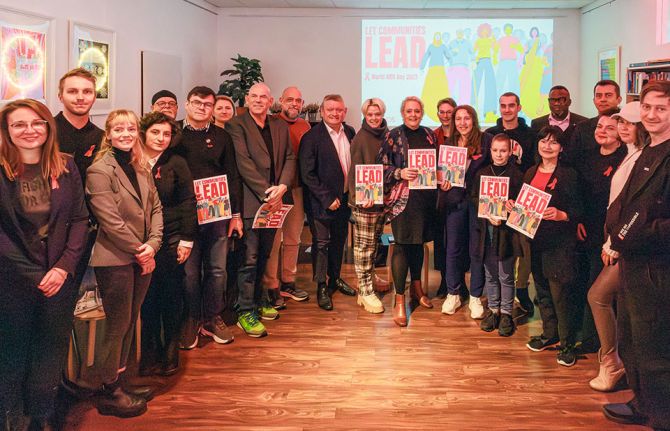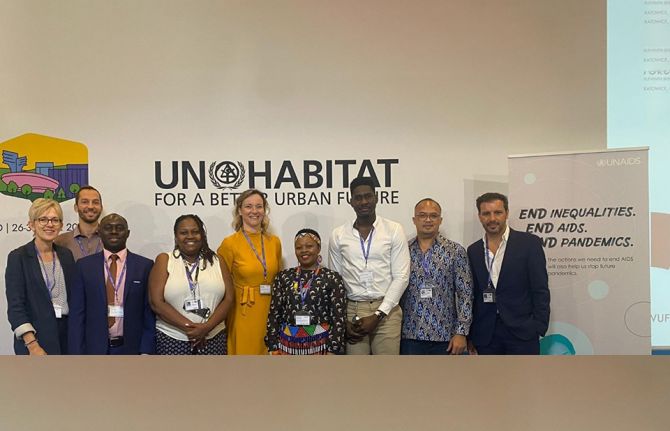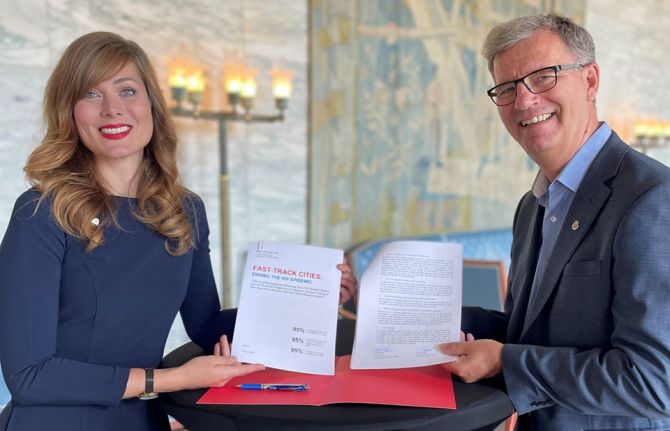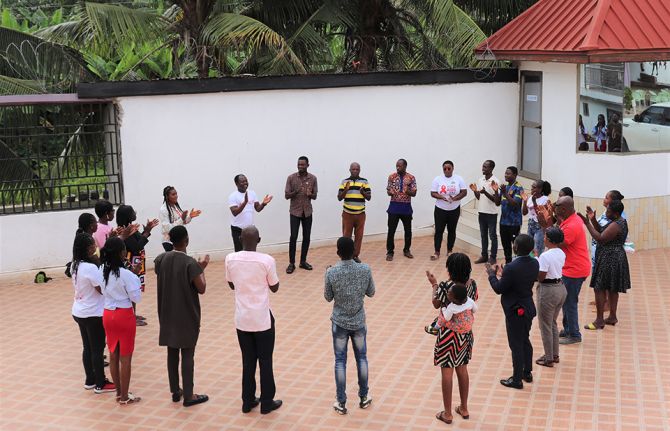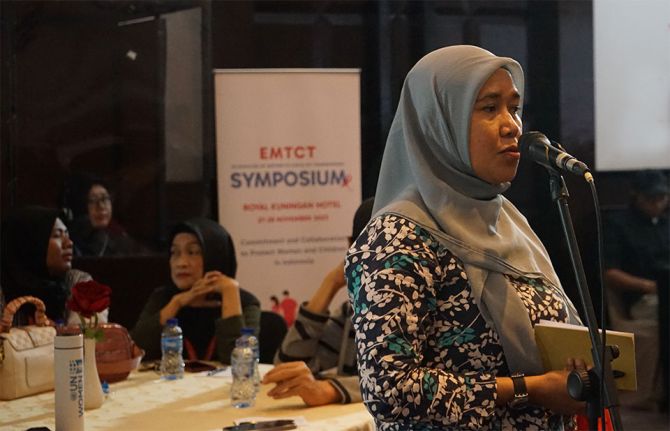
Feature Story
Cricket stars raise awareness about HIV in South Africa
26 October 2009
26 October 2009 26 October 2009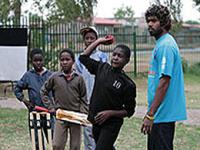
Lasith Malinga, a star player on the Sri Lanka Champions Trophy cricket team, gives a mini-bowling clinic to a group of children in the UNICEF-supported ECHO adolescent development programme in Katlehong Township, South Africa Credit: UNICEF South Africa/2009/Ingham-Brown
Famous Sri Lankan cricketers Kumar Sangakkara, Angelo Mathews, Chamara Kapugedera and Lasith Malinga recently visited young people living with HIV at the WITSECHO Adolescent Sprint Holiday Programme near Johannesburg, South Africa.
The visit took place at the Katlehong Art Centre. It was organised in collaboration with ECHO – a local UNICEF partner that helps provide antiretroviral therapy for some 10,000 South African children – and with the THINK WISE global partnership between the International Cricket Council (ICC), UNAIDS, UNICEF and the Global Media AIDS Initiative.
The THINK WISE partnership works to educate cricket players, coaches, commentators, broadcasters, volunteers and spectators about the AIDS epidemic and HIV prevention.
Raising awareness
THINK WISE is a pioneering partnership which brings anti-AIDS messages home in innovative ways and its ambassadors are doing a great job.
Catherine Sozi, UNAIDS country coordinator for South Africa
Following a spirited fielding session, the cricketers heard from the staff and young people at the youth programme about the work it does to help adolescents develop life skills. The programme trains peer educators to encourage HIV prevention by building the self-esteem and confidence of other young people – and thereby help them make responsible choices.
Most of the children in attendance had contracted HIV from their mothers, who either did not know that they were HIV-positive when they were pregnant or did not have access to treatment that could have prevented them from transmitting the virus to their children.
“It is fantastic to be here today to see firsthand the work that local partners carry out to tackle HIV,” Mr. Sangakkara said, speaking as an ambassador of THINK WISE and the cricketing community. “The work that this programme does has a real impact on the life of these young people and gives me great hope,” he added.
Protection, respect and fairness
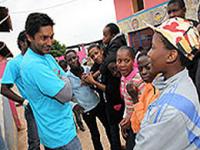 Sri Lanka captain Kumar Sangakkara chats with children in Katlehong Township
Sri Lanka captain Kumar Sangakkara chats with children in Katlehong Township Credit: UNICEF South Africa/2009/Ingham-Brown
“I hope that young people living with HIV can grow up without discrimination and can lead fruitful lives,” said Mr. Mathews. “The young people I have met today are an inspiration, and I hope more people across the world will be able to make informed decisions as they grow up.”
The goals of THINK WISE include encouraging youths to protect themselves and others, and to show respect and fairness to people living with HIV.
“Protection, respect and fairness – these are all values which cricketers easily relate to in our own sport,” said Mr. Malinga.
Catherine Sozi, UNAIDS country coordinator for South Africa, welcomed the visit. “We really appreciated the cricketers taking time to meet young people living with HIV and helping to raise awareness about key issues such as prevention and stigma and discrimination. THINK WISE is a pioneering partnership which brings anti-AIDS messages home in innovative ways and its ambassadors are doing a great job.”
South Africa bears a heavy AIDS burden with an estimated 5.7 million people living with HIV, some 280,000 of whom are children under the age of 15. There are also around 1.4 million children under 17 who have been orphaned due to AIDS.
Cricket stars raise awareness about HIV in South
Cosponsors:
Partners:
Unite for Children, Unite against AIDS
International Cricket Council (ICC): THINK WISE
Global Media AIDS Initiative
Multimedia:
Feature stories:
United for UNICEF: Manchester United visit highlights HIV and rights of vulnerable children (27 August 2009)
Peer educators raising HIV awareness through sport in Trinidad and Tobago (03 June 2009)
UNICEF working to teach AIDS prevention to young people in Guinea (16 April 2009)
UNICEF: Communities provide a bigger ‘family’ for orphaned children in Rwanda (09 March 2009)
Third stocktaking report on children and AIDS (01 December 2008)
Publications:
Children and AIDS: Third stocktaking report, 2008 (pdf, 1.90 Mb.)
Children and AIDS: Third stocktaking report, 2008, Summary (pdf, 2.71 Mb.)
Related

Feature Story
European development community discuss global health challenges
23 October 2009
23 October 2009 23 October 2009
Executive Director of UNAIDS Mr Michel Sidibé participated in a panel on global health challenges, 22 October 2009, Stockholm.
Credit: UNAIDS
The European Development Days opened yesterday in Stockholm by Her Royal Highness Crown Princess of Sweden Victoria, the President of the EU Commission José Manuel Barroso and the Swedish Prime Minister Fredrik Reinfeldt.
The three day event brings together more than 1500 organizations and 400 individuals from the development community to discuss how to make development aid more effective, and it aspires to build a global coalition to achieve the Millennium Development Goals (MDGs) for 2015.
The European Development Days are hosted jointly every year by the European Commission and the EU presidency, with this year’s event being the fourth edition.
The Executive Director of UNAIDS Mr Michel Sidibé participated in a panel on global health challenges, which explored ways of making the world a healthier place, despite the ailing state of the global economy.
Mr Sidibé emphasized that the world is lagging behind when it comes to HIV prevention, outlining key barriers to halting the spread of HIV including investing resources with populations who are criminalized and marginalized.
“We have effective prevention interventions – however we are not convincing enough decision-makers to invest sufficiently in them”.
UNAIDS Executive Director Michel Sidibé
“We have effective prevention interventions – however we are not convincing enough decision-makers to invest sufficiently in them”, Sidibé continued, stressing that success will require building an HIV prevention movement with the grassroots to over come political inertia.
He also expressed the need for programmes to “address sexuality and gender inequality in frank, open ways, keeping up with a changing epidemic.”
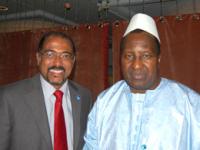
Executive Director of UNAIDS Mr Michel Sidibé meet with the former President of Mali, Mr Alpha Oumar Konaré during the European Development Days, 22 October 2009, Stockholm.
Credit: UNAIDS
The session also focused how to meet the health related MDGs, and Mr Sidibé spoke of the need to take the AIDS response out of isolation saying that policy-makers should leverage the energy and creativity of the AIDS movement to deliver on the AIDS+MDG agenda.
Lluis Riera, Director for Development Policy at the European Commission's Directorate General for Development, Michel Kazatchkine Executive Director of the global fund to Fight AIDS, TB and Malaria and Anders Nordström, Director General of the Swedish International Development Cooperation Agency (Sida) also addressed the session.
The Global Health Challenges session was a joint initiative of UNAIDS, The Global Fund to Fight AIDS, TB and Malaria, the GAVI Alliance, the Stop AIDS Alliance, and AIDS Accountability International.

Executive Director of UNAIDS Mr Michel Sidibé with Mr. George Soros during the European Development Days, 22 October 2009, Stockholm.
Credit: UNAIDS
While in Sweden, Mr Sidibé also took the opportunity to meet with Swedish non-governmental organizations (NGO) engaged in the AIDS response. Among them Noah's Ark, an NGO that has been involved in the fight against HIV since 1986, as well as representatives of the Swedish Network of People Living with HIV.
The European Development Days is hosted by the current EU President, Sweden and will conclude on 24 October.
European development community discuss global hea
Partners:
The Global Fund to Fight AIDS, Tuberculosis and Malaria
GAVI – The Global Alliance for Vaccines and Immunisation
AIDS Accountability International
The Stop AIDS Alliance
Multimedia:
Interactive map: Towards universal access
External links:
European Development Days
Save the Children, Sweden
Noah’s Ark
Publications:
Outcome framework (pdf, 384 Kb.)

Feature Story
Nigeria launches postal service campaign for HIV awareness
21 October 2009
21 October 2009 21 October 2009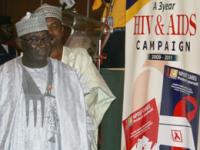
Nigeria’s Minister of State for Information and Communication, Mr Alhaji Aliyu Ikra Bilbis, launched the campaign.
Credit: UNAIDS
To mark World Post Day on 9 October, Nigeria held a national launch of a global awareness campaign in collaboration with the Universal Postal Union, UNAIDS, the ILO and UNI Global.
Nigeria’s Minister of State for Information and Communication, Mr Alhaji Aliyu Ikra Bilbis, launched the campaign by calling for the involvement of more stakeholders to support the government in the AIDS response in a comprehensive manner, adding, “Nigeria has demonstrated dynamism in the response to HIV.”
While congratulating Nigeria Post (Nipost) on its latest effort towards contributing to achieving the Millennium Development Goal of halting and reversing the spread of HIV by 2015, UNAIDS Country Coordinator Dr Warren Naamara said, “Nigeria has shown her commitment to achieving this MDG goal, but there is still a need to get more stakeholders and players on board so that the country’s response to HIV reaches even more people.”
The postal network has an extremely wide outreach; it is open to everyone from the young to the old and is an excellent and innovative way to raise awareness about how to prevent HIV.
UNAIDS Executive Director Mr Michel Sidibé
Dr Naamara encouraged Nipost to collaborate with the country’s National Agency for the Control of AIDS and the State Agencies for the Control of HIV to build a sustainable comprehensive multi-sectoral response to HIV and AIDS.
This innovative campaign provides post office visitors and employees with important information about how to prevent HIV through a series of eye-catching posters and hand-outs. The materials also give the address of a multi-language website on HIV prevention, hosted by UNAIDS, which provides detailed information about how to prevent infection.
The campaign in Nigeria is part of the first phase in a series of similar drives undertaken by the participating agencies in six other countries: Brazil, Burkina Faso, Cameroon, China, Estonia and Mali. The countries were chosen because of their HIV prevalence rates and to give a broad geographical spread. Nigeria has an HIV prevalence of 3.1% and ranks second only to South Africa in terms of the number of people living with HIV.
UNAIDS Executive Director Mr Michel Sidibé has commended the campaign for its innovativeness, saying, “The postal network has an extremely wide outreach; it is open to everyone from the young to the old and is an excellent and innovative way to raise awareness about how to prevent HIV.”
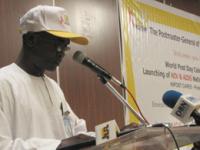
The Postmaster General of Nigeria Mallam Ibrahim Mori Baba read a statement at the launch.
Credit: UNAIDS
During the first phase, nearly 24,000 post offices in seven countries are displaying and distributing information materials with more UPU member countries expected to join later. For the second phase, ILO is preparing a toolkit for postal employers to inform their staff about HIV. UNI Global, a global union which brings together over 900 trade unions representing over 15 million members worldwide, is working closely with the postal departments and trade unions for this phase. The third phase is planned for 2011, where the UPU will invite its member countries to issue a stamp to commemorate the identification of AIDS in 1981.
In many parts of the world, post offices already have a social role by promoting public health messages within their community. Over the next three years, the campaign will be expanded globally, potentially making its way into 600,000 post offices worldwide. This would mean that millions of people who use postal services every day as well as the 5.5 million postal employees worldwide would receive important information about how to prevent HIV transmission.
Nigeria launches postal service campaign for HIV
Cosponsors:
Press centre:
UNAIDS, Universal Postal Union, UNI Global Union and ILO launch global HIV prevention campaign
Feature stories:
International post office network to share HIV prevention messages (07 July 2009)
External links:
Universal Postal Union
UNI Global
Publications:
Post Network awareness campaign posters (pdf, 578 Kb.)

Feature Story
Scientists come together for the AIDS Vaccine Conference 2009
19 October 2009
19 October 2009 19 October 2009
UNAIDS Executive Director Michel Sidibé at the press conference of the 2009 AIDS Vaccine Conference. Paris, 19 October 2009. Credit: UNAIDS
The yearly AIDS Vaccine Conference opened in Paris today. High on the agenda are discussions on the progress made in vaccine development and implications of trial results for the future. In a keynote address to the conference, UNAIDS Executive Director Mr Michel Sidibé said access and affordability were the first challenges towards building an effective AIDS response.
Mr Sidibé spoke about positive developments related to the AIDS vaccine research field. The recent results in Thailand have given hope to the many scientists who are working on finding a safe and highly effective HIV vaccine. These efforts demonstrate the vigour and momentum of the collective global effort to deliver on the promise of AIDS vaccines, said Mr Sidibé.
A ready to use vaccine against HIV could be more than a decade away, but when it does become available, it needs to be financed as a public good that is accessible for all.
Michel Sidibé, UNAIDS Executive Director
The UNAIDS Head also spoke of the challenge in creating conducive conditions for massive uptake of an effective AIDS vaccine. Antiretroviral treatment has been around since 1996, but real access to treatment only came about after public pressure put on world leaders – as a result the prices of medicines came down giving millions of people living with HIV in developing countries access to treatment.
Today, AIDS activists are repeating these efforts to reduce prices, this time for second line antiretroviral medicines.
“A ready to use vaccine against HIV could be more than a decade away, but when it does become available, it needs to be financed as a public good that is accessible for all,” Mr Sidibé said, “Meanwhile we have to redouble our combination HIV prevention efforts to stop the continuing tide of new HIV infections.”
AIDS Vaccine 2009 will bring together established and young research scientists, with clinicians, epidemiologists and public health experts aimed at sharing experience and scientific advances and enhancing collaborations.
The first AIDS Vaccine Conference, organized by the Global HIV Vaccine Enterprise, was held in Paris in the year 2000 with the aim of advancing the field of HIV vaccine research through discussion, exchange and learning. The annual meeting is now seen as the leading forum for exchange of scientific information relating to the difficult challenge of developing an effective vaccine against HIV. It will conclude on 22 October.
Scientists come together for the AIDS Vaccine Con
Press centre:
Read UNAIDS Executive Director's speech at the AIDS Vaccine conference (19 October 2009)
Shifting scientific, health priorities and global economic downturn: Impact Investment in HIV prevention R&D
Feature stories:
OPINION: HIV vaccine—a public good to right a global wrong (02 October 2009)
Fifth African AIDS Vaccine Programme (AAVP) Forum (19 June 2009)
External links:
AIDS Vaccine Conference 2009
International AIDS Vaccine Initiative

Feature Story
China’s vocational schools play a key role in AIDS education
16 October 2009
16 October 2009 16 October 2009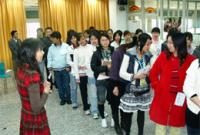
Vocational schools in China provide an avenue for reaching thousands of young people with HIV/STI prevention messages. Credit: ILO
The Zhaoqing Vocational School in Guangdong, China, provides basic technical skills to several thousand migrant workers a year. It is also one of the first schools of its kind in the country to include information on sexuality, reproductive health and HIV in its core curriculum. This model has now been scaled up nationally with technical assistance from the International Labour Organization (ILO).
Programmes like the one supported by ILO can serve as an excellent model to reach tens of millions of young people and their partners in China, right at the age when they are most prone to behaviours that put them at risk of HIV or other sexually transmitted infections.
Dr Bernhard Schwartländer, UNAIDS Country Coordinator in China
Many graduates from Zhaoqing’s school will find jobs along the province’s Pearl River Delta, which is the largest manufacturing zone in the world and employs over 60 million migrant workers from China’s rural areas. Before the students, who range in age from 14 to 19, enter the world of work, teachers are committed to imparting knowledge which will help protect them against frequent incidences of unwanted pregnancies and reportedly high rates of sexually transmitted infections such as HIV.
For many young people at the school the intervention seems to be working and they are reaping the benefits of greater openness and access to information. According to one female student, “At the beginning of HIV training I felt very nervous and shy. After the teacher's explanation I felt natural and accepted what she said. I felt I had known nothing about HIV… People with HIV are not dangerous and they don't deserve any discrimination.”
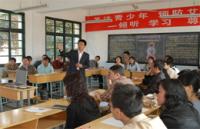
Vocational schools in China provide an avenue for reaching thousands of young people with HIV/STI prevention messages. Credit: ILO
Using the example of Zhaoqing and other similar schools, the ILO and the United States Department of Labor, (USDOL) have set out to reach as many of the 18 million students in the country’s 16,000 vocational schools as possible.
The ILO/USDOL project, known as SHARE (Strategic HIV/AIDS Responses in Enterprises), recognises that vocational schools are in a position to reach large
numbers of vulnerable young people with HIV, STI and reproductive health
training. A survey of 1,602 female students from vocational schools in Anhui, for example, showed that nearly 12% said they had had sex and, among these, more than 60% reported pre-marriage pregnancies.
Based on this need, SHARE has established programmes in 1000 vocational schools and trained over 2000 teachers in delivering participatory training. The Chinese Ministry of Human Resources is supporting this effort with a national policy which requires all vocational schools under its authority to integrate STI, HIV and reproductive health training into the psychological health curriculum.
According to Richard Howard, ILO Chief Technical Advisor of the HIV/AIDS workplace education project in China, "It is estimated that with the capacity built
in the vocational schools, five million students will be reached in China over the next five years.”
The authorities in the country are very much aware that, despite early successes, the project needs careful monitoring and evaluation. “Challenges ahead include how to track the impact of this intervention,” says Zheng Dongliang, from the Ministry of Human Resources and Social Security and National Project Director of the ILO/USDOL HIV/AIDS workplace project. He adds, "We can now assess how that knowledge has been transferred during examinations but our objective is to facilitate behaviour change and we are looking at ways to better monitor and evaluate the impact of the interventions to make sure we achieve positive behaviours among these vulnerable youth.”
In principle, sex education in Chinese schools was established in 1992. However, its implementation and effectiveness varies. Ms. Li Hua, a teacher at the Wuhu vocational school reports that “most often it is the teachers who are embarrassed to talk about sex with their students. The students are eager to learn and – when given the right space – talk openly about their experiences”. It is one of the objectives of this programme to equip teachers with the knowledge, the skills and tools to frankly discuss sexual and reproductive health issues in class.
“It is refreshing and encouraging to see teachers and students interact in a lively and imaginative way about rather private matters”, says Dr Bernhard Schwartländer, UNAIDS Country Coordinator in China. “Programmes like the one supported by ILO can serve as an excellent model to reach tens of millions of young people and their partners in China, right at the age when they are most prone to behaviours that put them at risk of HIV or other sexually transmitted infections.”.
China’s vocational schools play a key role in AID
Cosponsors:
Partners:
United States Department of Labor (USDOL)
Feature stories:
UNAIDS Task Team develops effective tools to help young people tackle HIV (05 June 2009)
Migrant workers and HIV vulnerability in South Asian and South East Asian countries (18 May 2009)
HIV response and the education sector: UNESCO Best practice series (04 May 2009)
'Never abandon, never give up’: ILO film helps China’s migrant workers challenge AIDS stigma (30 April 2009)
Publications:
A Strategic Approach: HIV & AIDS and Education UNAIDS IATT on Education, 2008 (pdf, 2.43 Mb.)

Feature Story
Partnering with faith based organizations for virtual elimination of mother to child transmission of HIV
14 October 2009
14 October 2009 14 October 2009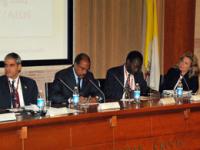
UNAIDS Executive Director Michel Sidibé in panel discussion with Dr Deborah Birx, Director of the Global AIDS Program, CDC, Dr Georges Tiendrebeogo, Royal Tropical Institute, Cordaid and Dr Miguel H. Diaz, U.S. ambassador to the Holy See. Rome, 14 October 2009.
Credit: US embassy to the Holy see
The Executive Director of UNAIDS, Michel Sidibé took part in a meeting on prevention and early treatment of HIV and TB in young children. The conference is being held at the Pontificia Universita’ della Santa Croce in Rome, and is organized by Caritas Internationalis and the Embassy of the United States of America to the Holy See.
The newly appointed president of the Vatican’s Pontifical Council for Health Care Workers, Archbishop Zygmunt Zimowski, opened the meeting.
Addressing the conference, Mr Sidibé stressed the importance of the faith community in delivering health care services and spreading hope, acknowledging that 30-70 percent of all health care in African countries is provided by faith based organizations (FBOs).
We have one of the most powerful networks on earth as key partners: the wide-reaching, dedicated communities of faith, driven by deep devotion to social justice and human rights.
Michel Sidibé, UNAIDS Executive Director
In partnership with faith based organizations the virtual elimination of mother to child transmission of HIV could be possible, said Mr Sidibé: “We have the technology. We have the will. And we have one of the most powerful networks on earth as key partners: the wide-reaching, dedicated communities of faith, driven by deep devotion to social justice and human rights.”
Mr Sidibé also highlighted the unique position of religious leaders as gatekeepers of large communities, to mobilize and sustain a vibrant grassroots movement in the AIDS response – a movement which urgently needs reinvigorating to call for prevention of mother-to-child transmission and integrated TB and HIV services at a national level.
With an estimated 370,000 children being born with HIV in sub-Saharan Africa every year and only 45 percent of HIV positive pregnant women receiving ARV prophylaxis on the continent, the meeting offers an opportunity to promote dialogue among Roman Catholic Church leaders on the urgent need to expand access to testing and treatment for children living with HIV and TB and to promote greater coverage of measures to prevent mother to child transmission of HIV.
During his visit to Rome, Mr Sidibé also had the opportunity to meet with representatives from Sant’ Egidio, the largest Catholic Lay volunteer organization in the world which provides 70,000 people with ART and nutrition in 10 sub-Saharan countries.
The conference will run from 14 to 16 of October and brings together medical doctors, member of religious orders, heads of Catholic run AIDS projects, professors of Theology, as well as representatives for the pharmaceutical industry.
It was co-sponsored by the Pontifical Council for Health Care Workers, UNAIDS, World Health Organization Stop TB Department, Stop TB Partnership, Health Commission of the Unions of Superiors General, and the ‘Bambino Gesù Children’s Hospital.
Preventing mothers from dying and babies from becoming infected with HIV is one of the key priority areas in the UNAIDS outcome framework 2009-2011
Partnering with faith based organizations for vir
Speeches:
UNAIDS Executive Director Michel Sidibé. Rome, (14 October 2009)
Feature stories:
Developing strategies to work with FBOs (10 April 2008)
External links:
Vatican: The Holy See
The U.S. Embassy to the Holy See
Caritas Internationalis
Sant’ Egidio
Publications:
Joint action for results: UNAIDS outcome framework, 2009 – 2011 (pdf, 388 Kb)
A faith-based response to HIV in Southern Africa: the Choose to Care initiative (pdf, 1.48 Mb)
Engaging with the Global Fund to Fight AIDS, Tuberculosis and Malaria: a primer for faith-based organizations (pdf, 719 Kb)
A report of a theological workshop focusing on HIV- and AIDS-related stigma (pdf, 1.09 Mb)

Feature Story
UNAIDS Head visits oldest HIV treatment centre in Karnataka
13 October 2009
13 October 2009 13 October 2009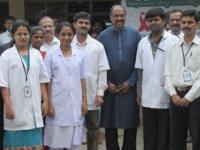
Michel Sidibé met with clinic staff including the counsellors, doctors and nurses as well as the Administration and Dean of the Medical school.
Credit: UNAIDS
Concluding his official visit to India yesterday, UNAIDS Executive Director Michel Sidibé visited the HIV treatment centre at Bowring & Lady Curzon Hospitals in Bangalore. The government run centre is the largest and oldest in Karnataka and has the highest rate of integrated HIV and TB services in India. The treatment centre is also one of the few sites able to both evaluate, with a viral load test, when first line treatment is failing, and provide access and establish people on second line treatment.
Mr Sidibé praised the work of Karnataka in leading the integration of HIV/TB services at the same facility and also for making access to second line treatment available to patients in need.
According to Mr Sidibé, "This clinic is a model, showing that access to 1st and 2nd line ART drugs made in India are being scaled-up for Indians in need of treatment." He said it represented an example of what could be possible in the future for Africa.
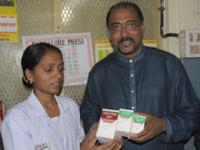
The HIV treatment centre at Bowring & Lady Curzon Hospitals in Bangalore able to establish people on second line treatment as needed.
Credit: UNAIDS
The UNAIDS Head had an opportunity to meet with patients and their families who shared personal testimonies of how treatment has given them back their lives and health, even enabling them to return to work. He also met with clinic staff including the counsellors, doctors and nurses as well as the Administration and Dean of the Medical school.
Mr Sidibé’s visit to Bangalore also included his participation in a civil society event in Bangalore, where he met with representatives of civil society and spoke with women living openly with HIV.
UNAIDS Executive Director first official visit to India also included events and meetings in New Delhi and Mumbai.
UNAIDS Head visits oldest HIV treatment centre in
Multimedia:
Feature stories:
UNAIDS Executive Director joins Chief Minister to launch Learning Site on HIV and sex work in Bangalore, India (12 October 2009)
UNAIDS Head visits outreach programme for men who have sex with men in Mumbai (11 October 2009)
Michel Sidibé congratulates Indian sexual minority communities for uniting against Section 377 (09 October 2009)
Michel Sidibé urges India to continue AIDS effort (06 October 2009)

Feature Story
UNAIDS Executive Director joins Chief Minister to launch Learning Site on HIV and sex work in Bangalore, India
12 October 2009
12 October 2009 12 October 2009
UNAIDS Executive Director Michel Sidibé joined the Chief Minister of Karnataka, B.S. Yediyurappa at the official launch of the Ashodaya Academy, Bangalore 12 October 2009.
Credit: UNAIDS
In Bangalore earlier today, UNAIDS Executive Director Michel Sidibé joined the Chief Minister of Karnataka, B.S. Yediyurappa at the official launch of the Ashodaya Academy – the first learning site on HIV in the Asia-Pacific region run entirely by sex workers. The Chief Minister welcomed the opening of the centre in Mysore, which begins its first HIV training course with over 200 sex workers from Ashodaya, as well as participants from as far away as Bangladesh, Cambodia, India, Myanmar and Nepal.
In the midst of the humanitarian crisis you are facing, your support for HIV is a special sign of your leadership and commitment to poor and vulnerable people without a voice.
Michel Sidibé, UNAIDS Executive Director
Michel Sidibé praised the commitment of the Chief Minister for taking time out from the ongoing relief and rehabilitation efforts of flood-hit Karnataka. "In the midst of the humanitarian crisis you are facing, your support for HIV is a special sign of your leadership and commitment to poor and vulnerable people without a voice," said Mr Sidibé.
“It’s a proud moment for us and we have come together to fight the spread of HIV,” said Prathima, a sex worker from in Mysore.
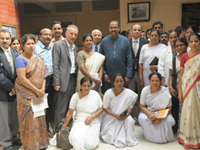
The Ashodaya centre will build the capacity of organizations to improve and develop community-led approaches for educating sex workers about HIV.
Credit: UNAIDS
Ashodaya Samithi, an association of sex workers in Mysore also expressed their appreciation that Chief Minister B.S. Yediyurappa had taken the time to attend the opening and offered his public support to them. The association of sex workers made a donation to the Government of Karnataka of 50,000 rupees, which their organization had collected in support of flood relief efforts.
The Chief Minister expressed how deeply he was touched by the charitable donation, saying that a donation of this size from them meant more to him than a donation 10,000 times larger from wealthy sources.
An outstanding example of one community supporting their brothers and sisters in another community in time of emergency and need.
Charles Gilks, UNAIDS Country Coordinator
UNAIDS Country Coordinator Charles Gilks said that the donation symbolized even more than its monetary value, representing “an outstanding example of one community supporting their brothers and sisters in another community in time of emergency and need.”
Karnataka has a relatively advanced HIV epidemic. The state is the second highest prevalence state in southern India with the adult HIV prevalence in several districts exceeding 1% for the past 9 years. Sex work is a key factor in HIV transmission in Karnataka. Mapping exercises have estimated there are more than 64,000 female sex workers in urban areas, and 61,000 in rural areas.
Outreach to these sex work communities is a vital part of the AIDS response in this region. The Ashodaya Academy will build the capacity of organizations to improve and develop community-led approaches for educating sex workers about HIV and it is supported by the Bill and Melinda Gates Foundation, the University of Manitoba and the Asian Development Bank in partnership with UNAIDS.
UNAIDS Executive Director joins Chief Minister to
Multimedia:
Feature stories:
UNAIDS Head visits outreach programme for men who have sex with men in Mumbai (11 October 2009)
Michel Sidibé congratulates Indian sexual minority communities for uniting against Section 377 (09 October 2009)
Michel Sidibé urges India to continue AIDS effort (06 October 2009)

Feature Story
UNAIDS Head visits outreach programme for men who have sex with men in Mumbai
11 October 2009
11 October 2009 11 October 2009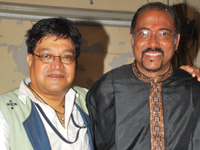
Leading gay activist Ashok Row Kavi (left) with UNAIDS Executive Director Michel Sidibé
Credit: UNAIDS
During his visit to The Humsafar Trust site in Mumbai, Executive Director of UNAIDS Michel Sidibé shared with its founder, gay activist Mr Ashok Row Kavi, his vision of achieving universal access to HIV prevention, care and treatment in India by 2010.
Mr Sidibé was visiting Mumbai during his first visit to India as Executive Director of UNAIDS, he also congratulated The Trust on its contribution towards making the annulment of Section 377 of the Indian Penal Code a reality. The organization was part of the petition filed in a Delhi court against Section 377 which criminalized homosexual sex.
The Humsafar Trust is one of the first organizations in India to advocate for the rights of men who have sex with men. In 1990 Mr Row Kavi, along with a few other self-identified homosexual men, started a magazine called Bombay Dost (Bombay Friend) in an effort to create a “gay community”. They were deluged with letters from other men around the country, and even further, from Nepal, Pakistan, Afghanistan and Central Asia who were also in search of this community. Five years later, Mr Row Kavi moved into a government-provided abandoned building amid slums in Mumbai to offer health education and related services to men who have sex with men.
Because sex between men doesn’t lead to procreation, it is not taken seriously in India. At Humsafar, we never ask who you are; we’re only interested in whether you’re playing safe or not.
Mr Ashok Row Kavi, founder, The Humsafar Trust
Today, the Humsafar Trust continues to offer a drop-in centre, counselling services and a medical clinic that provides treatment for sexually transmitted diseases, facilities for HIV testing and referrals for HIV treatment. The Trust has been a frontrunner in challenging Section 377 and bringing about legal change to the way homosexuality is treated in India.
Explaining how the Humsafar Trust came to being, Mr Row Kavi, who also works as a consultant to UNAIDS, said “Because sex between men doesn’t lead to procreation, it is not taken seriously in India. At Humsafar, we never ask who you are; we’re only interested in whether you’re playing safe or not.”
The Humsafar Trust was joined by the Naz Foundation (India) Trust, a New Delhi-based non-governmental organization working on the AIDS response and sexual health in India since 1994, and the Lawyers Collective in filing a petition in the Delhi High Court against Section 377. Their efforts were rewarded when, on 2 July 2009, the court in a historical judgment declared 377 a violation of the rights to privacy, liberty, health and equality enshrined in the Constitution of India.
During his recent visit to New Delhi, Mr Sidibé congratulated these activists at an event in their honour. The court ruling strengthens the National AIDS Control Organisation’s (NACO) efforts to reach out to people at higher risk of HIV.
The UNAIDS Head said India’s decision on 377 is a huge victory because “removing laws that criminalize and discriminate herald a new framework and new commitment and a new movement to universal access to health and human rights”.
Statistics provided by NACO show that Section 377 encouraged people to remain hidden, making it difficult for them to access essential HIV, health and social services.
In a meeting with positive networks and civil society representatives, Mr Sidibé reassured those living with HIV that they were central to the UNAIDS mission. He said he looked forward to renewed energy in the AIDS response nationally and globally, despite the global financial and economic crisis.
Mr Sidibé’s visit to India will conclude on October 12.
UNAIDS Head visits outreach programme for men who
Press centre:
AIDS responses failing men who have sex with men and transgender populations
UNAIDS welcomes historic decision by Delhi High Court to annul the law that criminalizes adult homosexual relations
Feature stories:
Landmark Delhi High Court decision recognizes inappropriate criminalization as a barrier to health, human rights and dignity (07 July 2009)
Global initiative to stop the spread of HIV among men who have sex with men (24 July 2007)
External links:
Publications:
UNAIDS Outcome Framework: Universal Access for Men who have Sex with Men (pdf, 323 Kb.)
State of Homophobia (pdf, 250 Kb.)

Feature Story
Michel Sidibé congratulates Indian sexual minority communities for uniting against Section 377
09 October 2009
09 October 2009 09 October 2009
(from right) Oscar Fernandes, Convener – Parliamentarians’ Forum on HIV/AIDS; UNAIDS Executive Director Michel Sidibé (centre); Dr Charles Gilks UCC India. New Delhi, 9 October 2009
Credit: UNAIDS
UNAIDS Executive Director Michel Sidibé attended an event in Delhi today to recognize the activists whose efforts contributed towards the recent annulment of Section 377 of the Indian Penal Code. The law, which criminalized consensual sex between men and transgendered people, was overturned in a historical judgment by the Delhi High Court on 2 July 2009.
Mr Sidibé congratulated India’s lesbian, gay, bisexual and transgendered communities for their solidarity leading up to the court judgment, declaring it “a victory for tolerance, fairness and equality”.
Mr Sidibé also called on the activist communities to mobilize in the response to HIV and act as a voice for the voiceless for those who are most vulnerable to HIV. “If such laws are removed, India’s HIV prevention programme could serve as a model in the future for other countries around the world,” Mr Sidibé said.
In his address to the award reception, Mr Sidibé also strongly advocated for the removal of punitive laws specifically against sex work and drug use which are detrimental to the AIDS response. He said criminalization risks pushing at communities already at higher risk “into the dark shadows and undermines our efforts to ensure universal access to HIV prevention, care and support services”.
Section 377
The High Court ruling came after a long legal battle in which India’s lesbian, gay, bisexual and transgendered communities made a united effort in order to make their voices heard.
A victory for tolerance, fairness and equality
Michel Sidibé, UNAIDS Executive Director
In its court affidavit against Section 377, India’s National AIDS Control Organization had contended that the law hampered HIV prevention efforts. It cited that only 6% of all men who have sex with men have access to HIV prevention, treatment, care and support services, as most of them are reluctant to reveal their same sex behaviour due to fear of extortion, harassment, and violence at the hands of law enforcement authorities. It was noted that Section 377 encouraged people to remain hidden, making it difficult for them to access essential HIV, health and social services.
According to Justices Shah and Muralidhar, the Constitution of India recognizes, protects and celebrates diversity, and they declared Section 377 as a violation of the rights to privacy, liberty, health and equality enshrined in this Constitution.
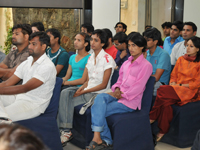
The event was held to recognize the activist communities whose efforts contributed towards the recent annulment of Section 377 of the Indian Penal Code. New Delhi, 9 October 2009
Credit: UNAIDS
Though the decision was largely seen as a victory for men who have sex with men and transgendered people, it has been hailed as a victory for all – regardless of sexual orientation and gender identity. The judgment is noteworthy and progressive in terms of its rejection of a hetero-normative and homogenous conception of sexuality. The judgment held that morality cannot be held as a ground for restriction of fundamental human rights.
There are around 80 countries worldwide with laws which criminalise same sex behaviour. Through collaborating with civil society as well as other stakeholders UNAIDS works towards removing punitive laws, polices and practices that hamper the AIDS response. This in one of the nine priority areas in the UNAIDS outcome framework 2006-2011.
Representatives from the sexual minority communities in New Delhi also explored with Mr Sidibé ways of successfully engaging with government and health authorities in the wake of the court ruling.
Michel Sidibé congratulates Indian sexual minorit
Press centre:
AIDS responses failing men who have sex with men and transgender populations
UNAIDS welcomes historic decision by Delhi High Court to annul the law that criminalizes adult homosexual relations
Feature stories:
Landmark Delhi High Court decision recognizes inappropriate criminalization as a barrier to health, human rights and dignity (07 July 2009)
MSM and the global HIV epidemic (31 July 2008)
Publications:
UNAIDS Outcome Framework: Universal Access for Men who have Sex with Men (pdf, 323 Kb.)
State of Homophobia (pdf, 250 Kb.)
Joint action for results: UNAIDS outcome framework, 2009 – 2011 (pdf, 388 Kb)




